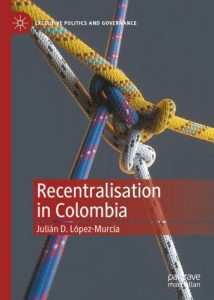In Recentralisation in Colombia, Julián D. López-Murcia explores administrative, fiscal and political recentralisation in Colombia, examining three decades of state administrative reforms from 1994 to the 2020s. This masterly and timely work offers a decisive contribution to decentralisation theory in general and specifically the debate about governance and state-building in Latin America, writes Juan David Parra.
Recentralisation in Colombia. Julián D. López-Murcia. Palgrave Macmillan. 2022.
 Find this book (affiliate link):
Find this book (affiliate link):![]()
Recentralisation in Colombia by Julián D. López-Murcia is a timely book, decisively contributing to decentralisation theory in general, and specifically to the debate about governance and state-building in Latin America. In the author’s words, ‘the scholarship on recentralisation is almost entirely based on empirical literature. With [some] notable exceptions […] there are no big theoretical efforts regarding the notion and dimensions of recentralisation or any analysis beyond the case under study’. This work, based on López-Murcia’s doctoral dissertation at the Department of Politics and International Relations at the University of Oxford, aims at addressing that academic gap.
Why, despite the agreement among reformers worldwide that decentralisation leads to better democratic governance, do some state representatives in democratic societies resist it? López-Murcia’s extensive fieldwork, consisting of scrutiny of public documentation and analysis of more than 100 in-depth elite and non-elite interviews, reconstructs the process and reflects on the causes of three decades of state administrative reforms in Colombia from 1994 to the 2020s. In so doing, he seeks to illuminate the answer to this empirical puzzle. Methodologically speaking, the book will gain the attention of researchers seeking good examples of the applied process-tracing method, which influential sociologists and political scientists portray as an alternative to reductionist input-output quantitative models in causal research.
To frame the first steps of his analysis, López-Murcia extrapolates elements from Tulia Falleti’s work in decentralising theory. He hence defines recentralisation as ‘the set of formal and informal policies and reforms that transfer resources, authority, or responsibilities from lower to higher levels of government, after a process of decentralisation’.
Chapter Two then proceeds with a literature review of country case studies, documenting recentralisation experiences to seek evidence for the linkages between the hypothesised interacting elements in his definition. Here López-Murcia argues that one evident weakness of previous studies is that scholars usually ignore the possibility that the results of an initial recentralisation (or decentralisation) effort could affect the context of following reform initiatives. It is as if the preferences of social actors either pursing or resisting these reforms remained unaltered after modifications to the ‘rules of the game’.

Image Credit: Photo by Dan Dennis on Unsplash
The second stage in López-Murcia’s study explores secondary literature to reconstruct a genealogy of Colombia’s principal de/recentralisation regulations since the 1980s. Based on that picture, he proposes the central theoretical foundation of his book: ‘The main transfers of responsibilities, resources and authority from lower to higher levels of government in Colombia (after the processes of decentralisation of the 1980s and early 1990s) can be explained as the outcomes of the interaction between economic performance (crisis/boom) and institutional contexts (predominantly decentralised/predominantly recentralised).’
This framework makes explicit the author’s intention to avoid the theoretical determinism of previous academic work, which in his view overstates the role of economic restrictions as drivers of state reforms. Instead, López-Murcia focuses on a dynamic analysis of contingent social interactions between national and sub-national politicians that have shaped a somehow unexpected recentralisation trend in Colombia. This is one of his core methodological contributions to the literature.
In the following chapters, López-Murcia proceeds with his original empirical analysis by documenting in detail the efforts of five national government administrations to (in most cases) reverse previous decentralisation reforms reflected in Colombia’s 1991 Constitution.
Chapters Five to Nine follow a similar presentation structure: a description of principal recentralisation attempts by the executive power (either fiscal, administrative or political); an analysis of the causes of those efforts (economic inputs and institutional contexts) and their causal mechanisms (self-reinforcing or self-destroying dynamics, as he labels them); and a conclusion reiterating the main findings for each section. Here it is worth noting that the author literally spoke with many of the protagonists of the political processes he is scrutinising – including former presidents, government ministers, high-ranking officials of planning and policy units, members of the congress and some ex-governors of Colombian sub-regions. In my opinion, that fact alone might grant the book a position in the classic literature on state-building in Latin America.
In a nutshell, the book argues that the most crucial causal mechanism of recentralisation in Colombia in recent decades has been the political learning of national leaders on how to persuade local governments to limit their political autonomy over time. Notably, reforms in the analysed period did not include legal restrictions to the free election of sub-national and local officials (with some subtle exceptions). However, López-Murcia shows that high-ranking officials’ initiatives to reshape institutional arrangements regarding fiscal and administrative forms of decentralisation effectively concentrated decision-making power in Bogotá. As the author explains, ministers and national planners resorted to different persuasion tactics to meet this end. These included, for instance, the manufacturing of discourses publicly blaming governors and majors for national economic crises to affect their legitimacy, and the strategic relocation of resources between sub-national governments to profit from the anticipated governance conflicts and strengthen alliances with specific local politicians.
From the book’s argument, one can interpret that national policy planners in Colombia were never entirely convinced about (at least some of) the benefits of deconcentrating political, administrative or fiscal powers as the Constitution in 1991 dictated. On this last point, and specifically regarding the author’s use of causal mechanisms, I see a potential limitation to his argument. As a critical realist-oriented scholar myself, I endorse the view of a causal mechanism as ‘a particular and necessary relation that connects a specific cause with its eventual outcome in broadly similar contexts’. However, López-Murcia’s analysis of causal mechanisms focuses on the process through which X connects to Y. This leaves unanswered questions about specific social and institutional circumstances that made that connection possible in the first place. For instance, what explains the preference of Colombian political and technocratic elites for a particular type of state configuration, and what grants them the power to succeed in enforcing that vision?
Nonetheless, López-Murcia’s remark in the closing section of his original PhD thesis makes me think he would agree with at least some elements of my last comment. ‘It would be useful’, he writes, ‘for the research programme on recentralisation to develop more systematic analyses of the preferences of higher, intermediate and lower levels of government regarding [types of state administration] reforms’. Therefore, my potential critique does not compromise the quality and the multiple merits of this magnificent book. In the end, as the author recognises, he has opened an exciting research agenda. Scholars from different academic disciplines interested in studying recentralisation and decentralisation will surely be grateful to him for writing this masterly work.
Note: This review gives the views of the author, and not the position of the LSE Review of Books blog, or of the London School of Economics and Political Science. The LSE RB blog may receive a small commission if you choose to make a purchase through the above Amazon affiliate link. This is entirely independent of the coverage of the book on LSE Review of Books.






